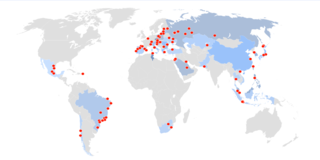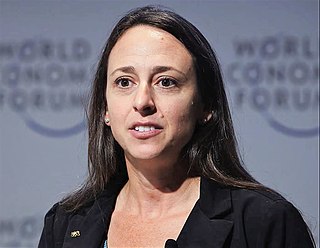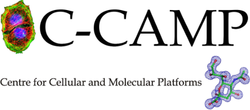A startup or start-up is a company or project undertaken by an entrepreneur to seek, develop, and validate a scalable business model. While entrepreneurship includes all new businesses including self-employment and businesses that do not intend to go public, startups are new businesses that intend to grow large beyond the solo-founder. During the beginning, startups face high uncertainty and have high rates of failure, but a minority of them do go on to become successful and influential, such as unicorns.
A business incubator is an organization that helps startup companies and individual entrepreneurs to develop their businesses by providing a fullscale range of services, starting with management training and office space, and ending with venture capital financing. The National Business Incubation Association (NBIA) defines business incubators as a catalyst tool for either regional or national economic development. NBIA categorizes its members' incubators by the following five incubator types: academic institutions; non-profit development corporations; for-profit property development ventures; venture capital firms, and a combination of the above.
GARUDA(Global Access to Resource Using Distributed Architecture) is India's Grid Computing initiative connecting 17 cities across the country. The 45 participating institutes in this nationwide project include all the IITs and C-DAC centers and other major institutes in India.
Discovery Park is a 40-acre (160,000 m2) multidisciplinary research park located in Purdue University's West Lafayette campus in the U.S. state of Indiana. Tomás Díaz de la Rubia, an energy and resources industry executive who also spent a decade as a top scientist and administrator at Lawrence Livermore National Laboratory, serves as Discovery Park's Vice President.
A technology business incubator is a type of business incubator focused on organizations that help startup companies and individual entrepreneurs which use modern technologies as the primary means of innovation to develop their businesses by providing a range of services, including training, brokering and financing. In several countries, including India, China, and the Philippines, there have been government initiatives to support TBIs. Organizations designated as of technology business incubator often receive funding or other forms of support from the national government.

Microsoft Innovation Centers (MICs) are local government organizations, universities, industry organizations, or software or hardware vendors who partner with Microsoft with a common goal to foster the growth of local software economies. These are state of the art technology facilities which are open to students, developers, IT professionals, entrepreneurs, startups and academic researchers. While each Center tunes its programs to local needs, they all provide similar content and services designed to accelerate technology advances and stimulate local software economies through skills and professional training, industry partnerships and innovation. As of 10 September 2010, there are 115 Microsoft Innovation Centers worldwide, most of which are open to the public. Recently it was reported that Microsoft had proposed to build about 100 innovation centers in India, and several in China. Some innovation centers have also started to develop in Pakistan.

The Technology Innovation Agency was created by an act of the South African parliament on 24 November 2008.
The Regional Centre for Biotechnology (RCB) is an autonomous institution of education, training and research established under the auspices of United Nations Educational, Scientific and Cultural Organization (UNESCO) and Department of Biotechnology. The Parliament has passed the Regional Centre for Biotechnology Bill, 2016 to provide statutory status to the existing institution. Dr. Arvind Sahu is the executive director of RCB.
The Banting and Best Centre for Innovation and Entrepreneurship is an initiative of the University of Toronto which facilitates business mentorship and the development of commercially viable innovations. The goal of the Centre is to foster startup companies by supporting new ideas as they are developed and then during the incubation phase on through commercialization.

The Israel Innovation Authority (IIA) is the support and investment arm of the Israeli government, in charge of planning and executing the country’s innovation policy, promoting technological innovation and research and development (R&D) in the state of Israel.

The Entrepreneurship Cell, IIT Bombay, also known as E-Cell, IIT Bombay, is the primary entrepreneurship promoting body of the Indian Institute of Technology Bombay, managed and run completely by the students of the institute. It organizes initiatives like the annual business plan competition Eureka! and the flagship event, The Entrepreneurship Summit (E-Summit) in January each year, which receives a footfall of over 30,000 people who include students, investors, corporates, mentors, celebrities and the most important; Entrepreneurs.

The Global Innovation through Science and Technology initiative (GIST) is a U.S. government program on innovation and entrepreneurship. The program assists business people in establishing startups. GIST participants in 135 emerging economies can develop skills, build networks, find mentors, and access financing through a combination of in-country training, a pitch competition, interactive online programming, and direct connections to U.S. experts. GIST helps create conditions for successful local entrepreneurship ecosystems and enables global youth to develop local solutions to local problems. GIST is also one of the key programs under President Obama's SPARK Initiative, an initiative under which programs are selected to represent the best work being done by the U.S. Government to advance entrepreneurship around the world.

Kerala Startup Mission (KSUM), formerly known as Technopark TBI, is a state-level agency under the Government of Kerala, India, dedicated to fostering entrepreneurship and incubation activities. Established primarily to manage the Technology Business Incubator (TBI), a startup accelerator, KSUM aims to cultivate a conducive environment for high-technology-based businesses.
Social entrepreneurship in South Asia involves business activities that have a social benefit, often for people at the bottom of the pyramid. It is an emerging area of entrepreneurship that is supported by both the public sector and the private sector.
ANSR is a business consulting company. It was established in 2004 by Lalit Ahuja. Since its inception, ANSR has established over 125 GCCs aggregating to over 125K enterprise talent with over $1.6B in investment.
York Entrepreneurship Development Institute (YEDI) is a venture fund, startup accelerator, incubator and entrepreneurial community located within York University in Toronto, Ontario, Canada. YEDI facilitates collaboration between students, alumni, and academic and business leaders. The organization was founded in 2013 by businessman Dr. Marat Ressin, a native of Russia with close ties to the Jewish community in Canada.

Chukwuemeka Fred Agbata Jnr. also known as CFA is a Nigerian journalist and a former television presenter at Channels TV. He is into digital marketing and known as a technology entrepreneur with focus on business coaching and public speaking. He hosted the first virtual telehealth conference of Nigeria’s telemedicine company, CareClick with the theme ‘The Future Of Healthcare Today’ on 24 September 2020. He was involved in various ICT-related companies that contributed to the development of the Founder Institute. He is known as the founder of Pacer Venture and has links with Climate Action Africa. He is the MD/CEO of Anambra State ICT Agency.

Amy Elizabeth Herr is an American professor. She is the John D. and Catherine T. MacArthur Professor at the University of California, Berkeley, where she is attached to the Department of Bioengineering. At Berkeley she was also the founding executive director of the Bakar Bioenginuity Hub. Herr is a Chan Zuckerberg BioHub Investigator and the Chief Technology Officer of the Chan Zuckerberg Biohub Network, a fellow of both the National Academy of Inventors and the American Institute of Medical and Biological Engineering, as well as a co-founder of Zephyrus Biosciences, a biotechnology company that was acquired by Bio-Techne.

CIIE.CO is an Indian startup accelerator and incubator that supports early-stage startups located at IIM Ahmedabad in Ahmedabad, India. It was founded in 2002 to promote innovation and entrepreneurship in India. It is a Center of excellence set up at Indian Institute of Management Ahmedabad with support from the Government of India's Department of Science and Technology and the Government of Gujarat.









